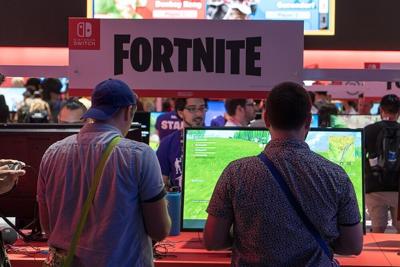
The makers of Fortnite and other popular videogames are defendants in litigation alleging that excessive use of their products can damage adolescents’ brains.
Los Angeles County has become a venue for lawsuits alleging video game makers are to blame for minors’ gaming addictions and associated ailments even as the industry says pre-existing mental health conditions are what leads to gaming disorders.
In May, the Judicial Council of California signed off on a plan to consolidate all video game addiction lawsuits, with Los Angeles County Superior Court Judge Samantha Jessner selected to oversee this centralization effort. Such video game addiction lawsuits have been filed in Fresno, Kern, Los Angeles, Napa, Sacramento and San Diego counties, according to the council.
“This court will house video game addiction lawsuits from all over the country,” the Miller & Zois law firm reported.
One such lawsuit was filed in Los Angeles County in May by Woodland Hills resident Jennifer Sawyer, seeking to hold defendants Epic Games and Microsoft Corp. accountable for allegedly failing to warn consumers about the risks minors face from playing games such as Fortnite and Minecraft.
“Defendants are aware that for nearly two decades, science has shown that prolonged use of video games by minors can result in brain damage, cognitive decline, and physical and emotional deficits,” the lawsuit states. “Despite being fully aware of these risks, (the) defendants marketed their respective games, Fortnite, and Minecraft, and Xbox video game platform … to minors without implementing simple safety features, such as adequate parental controls, warnings or opt-in limits on the time minors can spend in-game.”
The complaint alleges that Sawyer’s minor son, identified only as F.A.S., became addicted to Fortnite and Minecraft, as well as Roblox, and suffered from diminished social interactions, indifference to other hobbies, anxiety, depression and withdrawal symptoms that included rage and physical outbursts.
The complaint seeks past and future economic and special damages on behalf of F.A.S., punitive damages, medical and related expenses, attorney fees and the cost of the lawsuit.
The Entertainment Software Association could not speak to the details of lawsuits it is not directly involved in, but the trade group stressed that video games are among the most dynamic and most enjoyed types of entertainment worldwide.
“We prioritize creating positive experiences for the entire player community and provide easy-to-use tools for players, parents and caregivers to manage numerous aspects of gameplay,” Aubrey Quinn, a spokeswoman for the association, told the Southern California Record in an email. “Claims that say otherwise are not rooted in fact and ignore the reality that billions of people globally, of all ages and backgrounds, play video games in a healthy, balanced way.”
A study published last month in the Journal of the American Medical Association (JAMA) that tracked thousands of adolescents concluded excessive gaming is a coping mechanism for those who have underlying mental health issues such as anxiety or attention-deficit/hyperactivity disorder (ADHD) – and not the cause of the mental health condition.
“In this cohort study of 4,289 adolescents, longitudinal models revealed that higher baseline levels of psychopathology were significantly associated with an increased risk of developing gaming disorder one year later,” the study said. “However, there was no significant association between gaming disorder and the development or worsening of psychopathology.”
The study suggested that efforts to treat underlying mental health issues in minors could help to prevent the onset or severity of gaming disorders.






